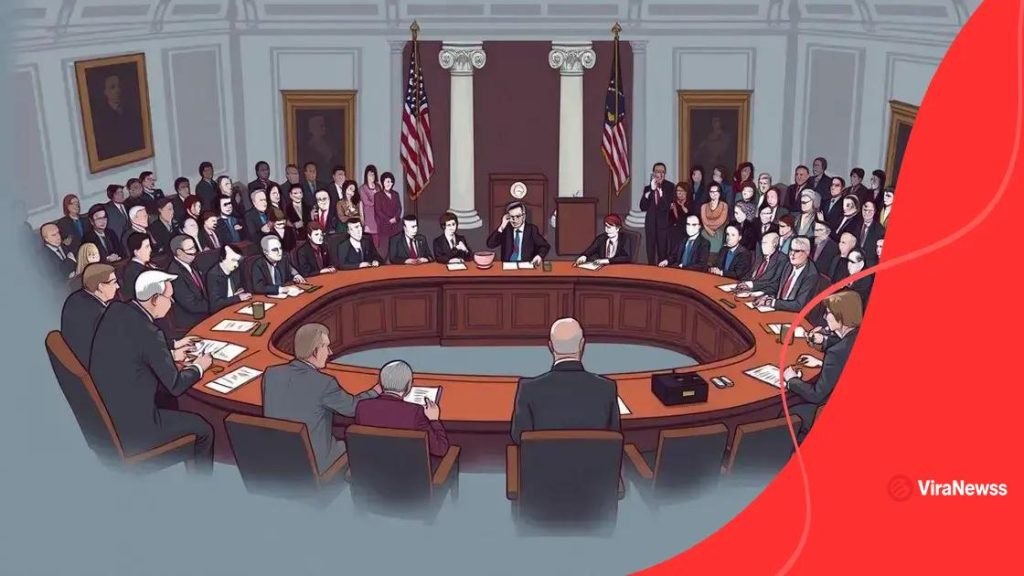Key votes in Congress this week: what to watch

Anúncios
Key votes in Congress this week focus on critical issues like healthcare reform, education funding, and infrastructure; public opinion and citizen engagement will significantly influence the outcomes of these legislative decisions.
This week, key votes in Congress are more than just numbers—they can change the course of legislation. With so much happening, it’s essential to stay informed. What issues are gaining traction, and how might they affect you?
Anúncios
Overview of key votes
Understanding the overview of key votes in Congress helps citizens know what’s happening in their government. This week, several votes will take center stage, each with the power to change policies and impact our everyday lives.
One important vote concerns budget allocations for various national programs. Lawmakers will discuss how to distribute funds, which will affect everything from education to healthcare. It’s essential to pay attention to these discussions because they directly impact the resources available for our communities.
Significant Issues at Stake
Several significant issues are lined up for debate:
Anúncios
- Funding for public education programs
- Healthcare reforms and their impact on coverage
- Climate change initiatives and their funding
- Infrastructure improvements across the country
These topics are not just political jargon; they affect millions of Americans. Each vote will be closely scrutinized by both the public and media, making it crucial for citizens to engage with these topics and advocate for their interests.
The second noteworthy vote focuses on the environment. With growing concerns over climate change, Congress aims to pass legislation that addresses clean energy and sustainable practices. A shift toward renewable energy sources shows promise not only for the planet but also for job creation in emerging industries.
Monitor Public Reactions
As Congress votes on these matters, public reaction can shape future legislative actions. Constituents must express their opinions to ensure their voices are heard. This engagement will guide lawmakers on important issues that matter to their voters. The way citizens interact with these votes can directly influence the outcomes, making awareness and participation vital.
In summary, an overview of the key votes provides insight into what is affecting our nation. By staying informed and involved, we can better understand legislative processes and advocate for change that aligns with our values and needs.
Impact on upcoming legislation
The impact on upcoming legislation can reshape many aspects of our society. As Congress votes on key issues, the laws that emerge will set the tone for policy direction across various sectors. Understanding how these votes influence future legislation is essential for every citizen.
One major area affected is healthcare. If Congress passes specific reforms this week, we may see changes that make healthcare more accessible and affordable. These amendments could adjust insurance coverage and funding for healthcare programs, directly impacting families and individuals who rely on these services.
Economic Consequences
The economy is another critical area where outcomes from these votes will have lasting effects. For instance, budget decisions related to infrastructure can lead to job creation or cuts. An increase in infrastructure spending is likely to boost local economies, while budget cuts may lead to layoffs or reduced public services.
- Boost in job creation through infrastructure projects
- Potential risks of budget cuts affecting public services
- Increased funding for education
- Impact on small businesses through tax reform
Moreover, environmental legislation has significant implications as well. With new voting outcomes, laws promoting clean energy initiatives could lead to sustainability efforts and job growth within green industries. These legislative changes can drive innovation while addressing climate concerns, impacting our future greatly.
As these votes unfold, the roles of citizens become crucial. Engaging with lawmakers, expressing opinions on social media, and participating in community discussions can amplify the voices of those affected. By doing so, the public not only influences legislation but also holds Congress accountable for its decisions.
Reactions from lawmakers

The reactions from lawmakers following key votes can reveal much about the political climate in Congress. Each vote sparks a range of emotions and responses that shape future discussions and public policy. Understanding these reactions is important for grasping the broader implications of legislation.
Immediately after a significant vote, reactions can vary widely based on party lines. Lawmakers often express their views through press conferences, statements, and social media. For instance, those in favor may celebrate the results, while opponents voice their concerns and outline potential issues with the passed legislation. This contrast plays a critical role in the narrative surrounding the vote.
Key Responses from Political Parties
Political parties usually have unified stances, but individual lawmakers may have unique takes. Here are some common responses:
- Supporters highlight the positive aspects and benefits of the legislation.
- Critics warn about potential negative impacts and consequences for constituents.
- Moderates often call for bipartisan cooperation to address concerns.
- Emerging leaders may use the moment to position themselves for future elections.
The media also plays a significant role in shaping public perception of lawmakers’ reactions. Coverage of debates, interviews, and analyses can amplify certain voices and perspectives, impacting how constituents view their representatives. This relationship between lawmakers and the media can lead to increased scrutiny, encouraging transparency in the legislative process.
As the public watches these reactions unfold, engagement can vary. Many citizens choose to reach out to their representatives, expressing support or disagreement with their stances. This dialogue between lawmakers and the public can influence future votes and policy decisions, making it crucial for citizens to stay informed and involved.
Public opinion on these votes
Public opinion on these votes plays a crucial role in shaping the outcomes of legislation. Citizens express their views on social media, through polls, or in discussions with friends and family. As these votes unfold, it is essential to understand how the public perceives and reacts to the issues at hand.
Recent polls show that public sentiment can fluctuate based on the media coverage and the outcomes of the votes. For example, if legislation is seen as beneficial, support often grows. When the public senses a negative impact, discontent and calls for accountability from lawmakers increase. This reaction cycle can affect future votes and policy directions.
Key Topics Influencing Public Opinion
Several factors influence public opinion regarding key votes:
- The relevance of the issues to daily life, such as healthcare and education
- Media portrayal of the legislation and its potential effects
- Public figures and organizations advocating for or against the policies
- Personal stories and experiences shared by constituents
Engagement from the public can take many forms. People may contact their representatives, participate in protests, or support campaigns for or against legislative decisions. Social media platforms allow constituents to voice their opinions quickly, amplifying discussions and potentially swaying lawmakers.
This dynamic creates a feedback loop between legislators and the public. When lawmakers receive substantial pushback or support from their constituents, they often feel compelled to adjust their positions or clarify their stances on upcoming votes. Monitoring public opinion thus becomes a vital part of the legislative process, impacting decisions made in Congress.
What to expect next week
Knowing what to expect next week in Congress can help citizens stay informed and engaged. With critical votes on significant issues approaching, it’s essential to be aware of the upcoming agenda and its potential impact on various sectors.
Next week, several pieces of legislation will be on the table for discussion. Among them are proposals regarding healthcare reforms and budget allocations, both of which can significantly influence everyday life for many Americans. Lawmakers will also focus on infrastructure spending, an area known to spark debates on funding and priorities.
Key Legislative Topics
Here are some important topics we can expect to see discussed:
- Healthcare reform and its implications for coverage
- Increased funding for public education
- New measures to tackle climate change initiatives
- Infrastructure projects aimed at job creation
As these discussions unfold, lawmakers will gauge public opinion and the reactions from their constituents. Expect a lively atmosphere in both chambers as diverse viewpoints collide and negotiations take place.
In the days leading up to these votes, it’s common for lobby groups and advocacy organizations to ramp up their efforts. They might organize campaigns to encourage constituents to voice their opinions on specific legislation. This can affect the final decisions made in Congress, as lawmakers often consider constituent feedback in their votes.
Overall, next week promises to be pivotal. Whether it’s through protests, social media discussions, or direct communication with representatives, citizen engagement will play a key role in shaping the legislative outcomes. Staying informed and involved is crucial during this critical time.
FAQ – Frequently Asked Questions about Key Votes in Congress
What are the key issues being voted on this week in Congress?
This week, Congress will vote on important issues such as healthcare reform, education funding, infrastructure projects, and climate change initiatives.
How does public opinion affect the decisions made in Congress?
Public opinion can significantly influence lawmakers. When citizens express their views, it can sway their representatives’ decisions and lead to changes in legislation.
Why is citizen engagement important during key votes?
Citizen engagement is crucial because it holds lawmakers accountable and ensures that the voices of the public are heard, impacting the outcomes of legislation.
What should I do to stay informed about upcoming votes in Congress?
Stay informed by following news updates, engaging with local advocacy groups, and communicating with your representatives about your opinions on key issues.





